Yes Jagmeet is doing a great job of selling himself to the Canadian voters but let’s get real. The reason the NDP are skyrocketing in the polls is the rigged economic system in Canada that is screwing over working people (students, seniors, working people, Indigenous Peoples, other visible minorities, the poor, the sick, the homeless), which Jagmeet addresses every time he speaks. There is no question this is reasonating with Canadians as Jagmeet's leadership continues to move the NDP up in the polls. In the last 24 hours I have seen NDP polls ranging from 17% to 20%, so the NDP has the momentum to do even better on October 21.
Do Canadians have the desire to address and reverse our rising inequality?
CBC and other MSM will just spew more bias slanting against them.
Let them spew their hatred and their poison.
Happy warrior Jagmeet is on fire, is preaching hope, and is another Jack Layton. Hopefully there is enough time for Jagmeet to lead the NDP to victory on October 21
Growing support for the NDP in BC
Trudeau focuses on B.C. to combat growing NDP support in province
Liberals, with their seriously damaged goods Leader, are now in full blown panic mode!
NDP bets big on new taxes targeting rich to pay for pharmacare, dental care, housing promises
Jagmeet refused to answer questions from white supremist - good!!!
THE ALT-RIGHT
Rebel Media reporter worked for white supremacist web store
Keean Bexte identified as one of the operators of Fireforce Ventures
https://ricochet.media/en/2422/rebel-media-reporter-worked-for-white-supremacist-web-store
Singh was right to play his cards close to his chest. He's making news when he needs to.
Agree it is no laughing matter but for totally opposite reasons than the Canadian rigged economic system constantly being pushed by our mainstream press With the excessive and massive wealth in Canada it is outrageous that people can’t pay for their medicine, have to go to food banks to eat and are homeless because the Liberals and Conservatives have destroyed any chance for the less privileged to get a financial break It is absolutely sickening and the Liberals and Conservatives who both represent Canada’s elite have screwed over Canada’s working people since the end of WW2
David Moscrop has excellent election commentary
All this gobbledygook about taxes on income
I occasionally invest in the stock market but why should I get a special tax break because some of my income comes from the stock market. This is a clear example of the rigged economic system in Canada which has stacked the financial system against the less privileged
Income is income!
https://www.google.ca/amp/s/beta.ctvnews.ca/national/federal-election-2019/2019/10/11/1_4635685.html
Most Canadians feel society is ‘broken’, politicians don’t care about them
https://globalnews.ca/news/5860959/canadians-society-politics-ipsos-poll/
Jagmeet Singh looks to defy the odds again on the campaign trail

VICTORIA, B.C.: April, 18, 2019 - NDP Leader Jagmeet Singh (in the photo), along with NDP
Photograph By ADRIAN LAM, TIMES COLONIST
OTTAWA — Jagmeet Singh is no stranger to beating long odds — which is good, since taking over the Prime Minister’s Office this fall seems the unlikeliest of outcomes for the leader of the federal New Democrats.
The energetic former criminal lawyer, who cuts a striking silhouette in his tailored suit, long beard and colourful turban as he rides his collapsible bike around Parliament Hill, captured the country’s imagination in 2017 when he became the first non-white to lead a federal party in Canada — a historic achievement, sure, but one he quickly ascribes to those who came before him.
article continues below
TRENDING STORIES
- Running in memory of fiancé in today’s Victoria Marathon
- Gillian Trumper obituary: Former Port Alberni mayor a tireless worker for others
- Victoria Marathon on Sunday: U.S. Olympic hopeful Florez eyes half the glory
- Mount Douglas Rams high school football program fined $1,500
“We as a team were only able to dare to dream of this kind of idea, running to be prime minister, because other people broke barriers,” the 40-year-old Singh said in a recent interview with the Canadian Press.
His hope, he said, is that young people will see a turbaned Sikh tearing down walls and be inspired to “dream of overcoming some challenge or barrier.”
The challenge Singh faces is substantial indeed.
Just four years removed from the heady pre-campaign days of 2015, when the NDP were within striking distance of forming their first-ever federal government, early polls showed Singh and company trailing Elizabeth May’s once-distant Greens, their status as Canada’s third party suddenly in jeopardy.
That looming undercard battle might be why Singh declared publicly last month that the NDP wouldn’t support the Conservatives in a minority Parliament — an eyebrow-raiser that was billed as a declaration of disdain for rival Andrew Scheer’s past statements on same-sex marriage, but interpreted by many as an early acknowledgment that the top job was beyond his grasp.
To hear him tell it, however, Singh is unconcerned by any Green threats.
They’re a “non-factor” in places like Brampton, Ont., he said — a key battleground where Singh is confident his deep connections to the community, forged during his past life as a member of the Ontario legislature, will hold the party in good stead.
“They’re not a factor, but I am,” Singh said. “I am a massive factor. People see me as their champion. They’ve seen that I fought for them and they see New Democrats as being on their side.”
He also points to groundswells of NDP support in Toronto, Vancouver and in B.C’s Lower Mainland — all areas where the party’s election campaign is expected to spend the bulk of its effort.
Singh — like the party he leads — is no stranger to long odds, said Jennifer Howard, his campaign manager and chief of staff.
“You have to have an understanding of what it takes to sometimes overcome the odds, and Jagmeet understands,” Howard said. “He’s also somebody who is more inspired to fight for other people than himself.”
Singh’s own path to politics has not been without adversity and trauma. In his autobiography, Love & Courage, he described being sexually abused at the hands of a martial arts instructor at age 10 while living in Windsor, Ont.
“He tied his perversion to my performance, which was my primary motivation,” Singh writes. “And as the weekend sessions continued on top of my weekly training, I convinced myself that I was improving at taekwondo.”
The book also documents the ripple effects of his father’s alcoholism on the family, and how Singh had to become the sole income-earner by working in retail — an experience that informs his political activism on pocketbook issues such as poverty and tuition fees.
“I got through those struggles because of a lot of help and my family depended on a lot of help,” he said, pointing to time his father spent at a publicly funded rehabilitation centre and help received from strangers when his family had nowhere to live.
“I don’t believe that someone’s job status or income level should determine their ability to succeed and do well in life, and that’s why I really passionately believe in social programs and services.”
In short, Singh is no stranger to being the underdog, said Howard. He likes to exceed expectations.
“I think he has, many times in his life, had to fight to get to where he is,” she said. “He knows how to do that."
Singh vows to help oilsands workers find new jobs with programs, funding
NDP Wins McGill Survey as Students Express Concern Over Climate Change
Higher voting levels usually suggest unhappy voters. Definitely not a good sign for the Liberals!
Talk about putting the fox in charge of the hen house WTF!
Advocates say decommodified housing and free transit needed to fight climate emergency
Montreal-area NDP candidates speak in favour of urban transit and housing proposals central to proposed ‘Green New Deal of the North’
Feeling inspired by the climate strikes? Now let’s elect real climate champions
Our Time has so far endorsed 29 ‘Green New Deal Champions’ in ridings across Canada
29 of the 35 champions are NDPers. Not one Liberal in the bunch. Who knew!
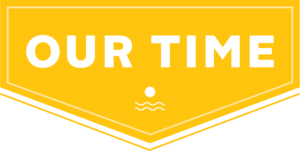
This is Our Time for a Green New Deal.
This election, we’re working for bold action to tackle the climate emergency!
Tax on super-rich a popular idea, except in the media
Wed., Aug. 28, 2019timer3 min. read
The Onion magazine once sardonically described the gap between rich and poor as the Eighth Wonder of the World — “a tremendous, millennia-old expanse that fills us with both wonder and humility… the most colossal and enduring of mankind’s creations.”
Another aspect of the rich-poor gap that fills me with wonder is the way the rich manage to keep it off the political agenda, although that may be changing.
Prominent U.S. Democratic presidential contenders Elizabeth Warren and Bernie Sanders are campaigning on taxing the super-rich, with Warren calling for a two per cent annual tax on wealth above $50 million, rising to three per cent on billionaires.
In Canada, where politicians have shied away from even putting their toe in the water when it comes to taxing the rich, NDP Leader Jagmeet Singh has taken a bold plunge, calling for a version of Warren’s tax — an annual one per cent tax on wealth over $20 million.
This is an excellent idea, and is apparently popular. A new Abacus poll shows that 67 per cent of Canadians support (or somewhat support) a wealth tax, along the lines proposed by Warren, and that even a majority of Conservative voters support it. That’s probably about the same percentage of Canadians who support (or somewhat support) Mother’s Day.
https://ricochet.media/en/2599/poll-over-two-thirds-of-canadians-back-a-wealth-tax
Yet the wealth tax has received little media coverage — beyond denunciations in the National Post, which surely has nothing to do with the fact the media is largely owned by billionaires.
One Post columnist posed the bizarre question: what is the problem to which creating a wealth tax is a solution?
Fortunately, the brilliant French economist Thomas Piketty answered that question at length in his celebrated international best-seller, Capital in the 21st Century, where he made the case for wealth taxes.
Without them, he argued with extensive data, wealth will become ever more concentrated, allowing the mega-rich to swallow up an ever larger share of the world’s resources.
Given that 26 individuals now have as much wealth as the bottom half of humanity (3.8 billion people), one wonders at what point conservative commentators might consider this a problem. What if one individual had as much as the rest of humanity — or if she had all the world’s wealth? Would that cause alarm at the Post?
Let’s not forget that the super-rich typically made their fortunes by selling products built by employees we all paid to educate, and shipping those products on roads we all paid to build.
Rupi Kaur officially endorses federal NDP leader Jagmeet Singh
A wealth tax would redirect a tiny fraction of those fortunes back to the community to help ordinary Canadians. I’d call that a good solution to the problem of millions of Canadians working really hard but still struggling to get by.
A wealth tax would also help curb the enormous political power of the super-rich. Fossil fuel billionaires, for instance, have effectively managed to block global efforts against climate change.
Billionaires and their defenders maintain the super-rich would find ways to hide their money from tax authorities. But then why do billionaires resist such taxes? Because they know they would actually pay more — just as they did in the early postwar years, when taxes on the rich were much higher.
Piketty notes that Warren’s wealth tax is in line with historically high U.S. tax rates on the rich. He maintains those higher rates were key to the strong economic growth from 1940 to 1980 — before Republicans gutted taxes on the rich, slowing down growth and swelling family fortunes.
https://boingboing.net/2019/02/12/81-pct-estate-tax-in-1980.html
The Canadian tax system also helps perpetuate dynastic fortunes. Canada is the only G7 country without an inheritance tax.
According to a study by the Canadian Centre for Policy Alternatives, between 2012 and 2016, the net worth of Canada’s wealthiest 87 families grew by more than $800 million — per family.
https://www.policyalternatives.ca/publications/reports/born-win
The study also found that inheritance is growing in importance. Among the wealthiest Canadian families, 45 per cent had passed down wealth at least one generation in 1999, compared to 53 per cent in 2016.
So much for the argument that the super-rich are increasingly self-made entrepreneurs.
Turns out that Canada’s billionaires are mostly winners in what Warren Buffett calls the “ovarian lottery.” They just think they hit a triple.
Higher voting levels usually suggest unhappy voters. Definitely not a good sign for the Liberals!
Higher advance voting means the parties are using it more and more as a tactic to lock in their vote early.
It’s a no-brainer - tax the billionaires!
More Liberal lies and deceit
More Liberal lies and deceit
Asked by reporters on Sunday whether he'd work with other parties, including Trudeau's Liberals, Singh replied: "Oh absolutely, because we're not going to support a Conservative government."
He is aluding to the BC situation. If the Conservatives win a minority Singh would work with the Liberals to form government. The Liberals would have to support the Conservatives and it won't be so easy this time.
The next day, Singh appeared to be stepping back from talk of partnership with other parties.
"My focus is not on a coalition. My focus is on this: If you vote New Democrat, you're going to get someone on your side," he said.
"I'm not negotiating the future today. Today I'm telling Canadians what they can do and what they can do is this: If you vote for a New Democrat, you know our priorities and where we stand."
Because some stupid media person tried a gotcha question to trap Singh into saying the NDP couldn't win. Most Canadians are fully aware that an NDP win is highly unlikely.
Singh is being real. People recognize it.
As the Jagmeet Singh-led NDP takes 10% off the Liberals, and 4% off the Conservatives this morning, there is no question that Canadians hnow have their eyes wide open and seeing the reality of Canada's rigged economic system in favour of the people represented by the Liberals and the Conservatives.
And unlike some other leaders that we all know, Jagmeet is not a deceiving, lying, and coming across as a .........when he talks with you.
Jagmeet Singh’s secret weapon: The way he talks.
The NDP leader switches seamlessly from formality to so-called ‘multicultural Toronto English,’ sounding educated and down-to-earth at the same time
https://www.macleans.ca/politics/jagmeet-singhs-secret-weapon-the-way-he-talks/
And let's stop allowing those right-wing Liberals from calling themselves progressive without challenging them on it, because the Liberals voted hundreds of time to keep right-wing Harper in power. Liberals are very good at lies, lies, and more lies and deceit.
Broken promises will cost Trudeau progressive votes
And let's stop allowing those right-wing Liberals from calling themselves progressive without challenging them on it, because the Liberals voted hundreds of time to keep right-wing Harper in power. Liberals are very good at lies, lies, and more lies and deceit.
Broken promises will cost Trudeau progressive votes
I think we still need to acknowledge that they are not the same as the Conservatives. Even if they at times do the same things. The Liberals and the NDP at times may do the same things as well.
There is considerable distance between these parties. I object to the Conservatives suggesting the NDP and the Liberals are the same as well. All three parties have very different visions. The NDP is the only social democratic party but that does not mean there are no differences between the Conservatives and the Liberals. That difference has been growing as the Conservatives move faster to the right than the Liberals.
Also let's stop calling the Liberals all right wing. They are not. They are mostly centre. This is just as bad as these hate spewing Bernier cult members who say that Scheer is left wing. The middle is the median point and that puts the NDP on the left the Conservatives on the right and the middle right through the Liberal party.
To call all Liberals right wing suggests we do not know where we are and where the centre is. Makes us look ignorant.
To notice a difference between the Conservatives and the Liberals does not mean that we cannot see the gulf that lies between the NDP and the Liberals. I do not like that attempt at propaganda that makes us look silly.
The Liberals and the Conservatives are both capitalist parties who have a similar vision of the economy. However the Liberals are definitely more interventionist that the Conservatives and the Conservatives indulge more in celebration of inequality, racism and religious-based policies. the Liberals are a let down, they are slow and not very ambitious but they brand themselves very differently.
All this gobbledygook about taxes on income
I occasionally invest in the stock market but why should I get a special tax break because some of my income comes from the stock market. This is a clear example of the rigged economic system in Canada which has stacked the financial system against the less privileged
Income is income!
https://www.google.ca/amp/s/beta.ctvnews.ca/national/federal-election-2019/2019/10/11/1_4635685.html
I think there are a few nuances to it, though don't disagree in principle. If your income is capital gain, I do think you have to look at how long you have held the capital property. I would support 100% inclusion in income but only if the cost-base were adjusted for inflation.
Let's say you were fortunate enough to have been able to buy $2,500 worth of shares in 1982 and sold them today for $10,000, it looks like you have made $7,500. But the reality is that $2,500 in 1982 is worth $6,250 in today's money, so your investment has really only appreciated by $3,750 or half as much.
As usual Sean and KarlL you do make some relevant observations.
KarlL,
There is always some reason not to tax the wealthy, eh!
How much Canadian wealth is offshore to avoid taxes like Liberal Prime Minister Paul Martin, and why has Canada not reigned it in. And we all know the answer to that, don't we!
Here is more absolutely outrageous right-wing shit, that fucks with our democracy, and Elections Canada WTF are you!
Manning Centre won’t disclose source of donations to third parties for attack ads on Liberals
Bingo!
Where did pollsters find the elusive Liberals of Edmonton Strathcona?

Volunteers for NDP candidate Heather McPherson's campaign in the federal Edmonton Strathcona riding are asking themselves, where the heck are those mobs of Liberal voters one pollster claims to have identified in the riding?
Door-knocking in 2019 in the progressive-leaning riding on the south side of the North Saskatchewan River feels much the same as it did in 2015, when New Democrat Linda Duncan went on to win by a comfortable 7,051-vote margin, NDP volunteers in the riding insist.
Things have changed in the past four years, of course. For one thing, Duncan is about to retire. But the Dipper doorknockers maintain they're getting about the same number of positive responses as they have in recent elections. There are few Liberal signs on private property.
So where are the hordes of Liberals the riding-specific poll by Toronto-based Mainstreet Research claims to have unearthed in September?
The first political activists in the riding heard of it was in a detail-deficient iPolitics story published on September 23.
Absent other information, the results showed up as a big jump for the Liberals in the 388Canada.com poll tracker on September 25 and 26 -- a development that if real could result in a split vote that favours Conservative Sam Lilly in what may be the only riding in the province with the potential to elect an opposition member this year.
The Liberals, understandably, jumped on it and pushed the poll's results hard in their efforts to boost their candidate, Eleanor Olszewski.
New Democrats believe it's a false narrative, but fear that if too many voters were persuaded by it, it could get Lilly elected.
A Star Edmonton story mentioned it -- again with very few facts -- on October 1. (The traditionally Liberal-leaning Star acquired iPolitics a year ago.)
On Saturday, Postmedia's Alberta newspapers, which nowadays campaign openly for the Conservatives, claimed in a riding profile presumably based on Mainstreet's poll, which was not acknowledged, that the NDP and Liberals are polling "neck and neck" in the riding and suggested Lilly would win.
So does the Mainstreet poll indicate a real trend, or is it an outlier for whatever reasons?
To answer this important question, it would be helpful to get more information about the poll's methodology and the wording of the questions it asked. Strangely, though, that information does not show up in any of the credulous mainstream media accounts seen so far. I asked Mainstreet president and CEO Quito Maggi for that information.
His emailed response was not particularly informative, unfortunately. "The poll was conducted for and published by iPolitics, it's behind their paywall for subscribers," he responded. "I can't provide further details beyond confirming that it exists and that the quote (in the October 1 Star story) is an accurate reflection of the poll findings at the time."
For more information, he suggested subscribing to iPolitics.
Well, sorry, but AlbertaPolitics.ca's subscription budget is all tapped out. So we'll just go with what we know about past Mainstreet polls, which are sometimes accurate, sometimes not so accurate, and now and then, in Maggi's own words, "a catastrophic failure."
The best example of the latter category was the 2017 Mainstreet prediction Calgary Mayor Naheed Nenshi would lose to his Conservative challenger by a wide margin. Nenshi won. That was the poll Maggi termed catastrophic.
Then there was the riding poll just before the Nanaimo, B.C., byelection in January in which the pollster said the B.C. Liberals had a huge lead over the NDP candidate (who won) and Mainstreet's much-reported forecast of a Green Party victory in the Prince Edward Island provincial election in April (which the Conservatives won).
Mainstreet also got the winners right but the margins wrong enough to be outside its margin of error in this year's provincial elections in Alberta, Manitoba and Quebec. Other Mainstreet polls have done better.
Still, this suggests at the very least that both the Star and Postmedia need to give their readers more information about the polls they report on.
Mainstreet's history notwithstanding, I'd bet money all three major parties' campaigns have a good grip on what's really happening on the ground now in Edmonton Strathcona -- and that it's not quite what Mainstreet said last month.
I've heard suggestions the Liberals are playing a long game -- get a weak Conservative candidate elected and then beat him with a star candidate in four years. Maybe, but I don't think that's the way political parties usually think, especially in an election this close. True or not, though, if the NDP loses narrowly and the Liberals get blamed, they may not be forgiven for it in the riding by the time the next federal election rolls around.
Or maybe progressive voters in Strathcona will blame one of the Green, Communist, Marxist-Leninist or People's Party candidates. Who knows?
My bet is the NDP are in fact a hair ahead of the other parties right now. After all, the Laurier Institute for the Study of Public Opinion shows the riding leaning NDP, and despite being impacted by the Mainstreet poll bump, the 388Canada.com poll aggregation site, updated on October 14, calls it a toss-up with the Conservatives narrowly ahead. In other words, it's the NDP and the Conservatives who are neck and neck.
Regardless, if you're a New Democrat and you live in Edmonton Strathcona, or for that matter just someone opposed to the Conservatives, you'd better get out there and make sure on election day that McPherson is far enough ahead to win.
David Climenhaga, author of the Alberta Diary blog, is a journalist, author, journalism teacher, poet and trade union communicator who has worked in senior writing and editing positions with The Globe and Mail and the Calgary Herald. This post also appears on David Climenhaga's blog, AlbertaPolitics.ca.
Jagmeet is a lawyer, a human rights activist and the Leader of Canada’s New Democratic Party.
Jagmeet Singh grew up in Scarborough, St. John’s, and Windsor, and served as an Ontario MPP from 2011 until 2017. On October 1st, 2017, he became leader of Canada’s NDP – guided by values rooted in his experiences growing up, Jagmeet is building a fairer, more just Canada where everyone can realize their dreams.
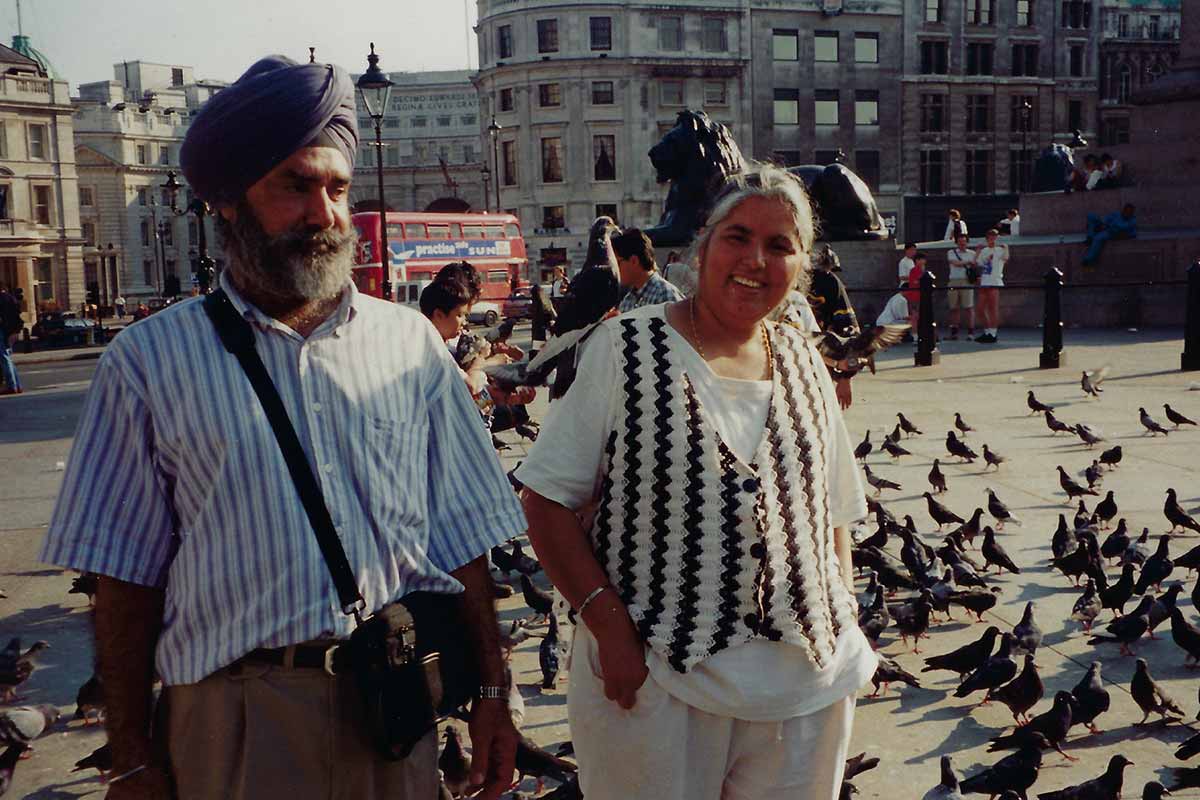
His family shares a story similar to that of so many Canadians
Jagmeet’s parents came to Canada to build a better life. His family worked hard to make ends meet so that Jagmeet and his younger siblings could follow their dreams and believe that anything is possible.
“The biggest influence in my life is my mother. As a kid, she taught me that we are all connected. That we are all one. She explained to me that if one person is suffering, then we are all suffering.”
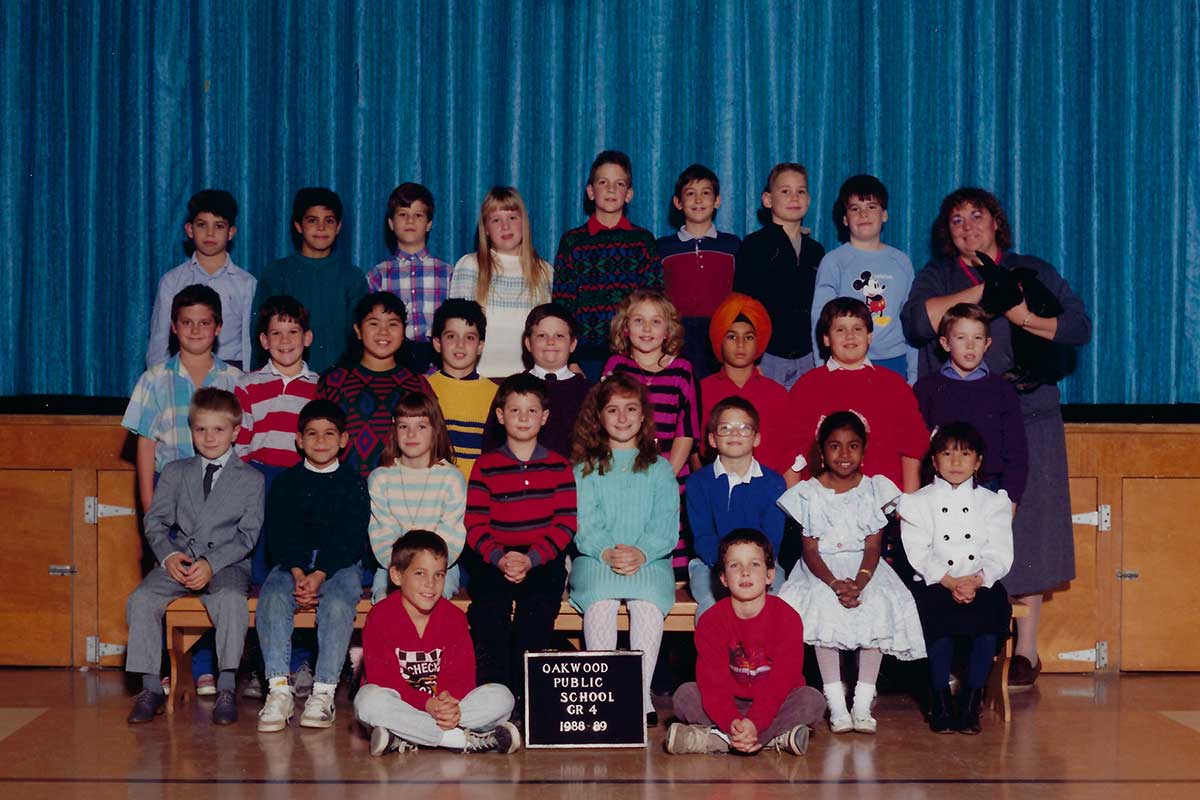
Jagmeet refused to let the challenges he faced growing up define him.
Like others who stand out, Jagmeet faced a lot of bullying in school and felt like he didn’t belong. But even then he realized he wasn’t alone.
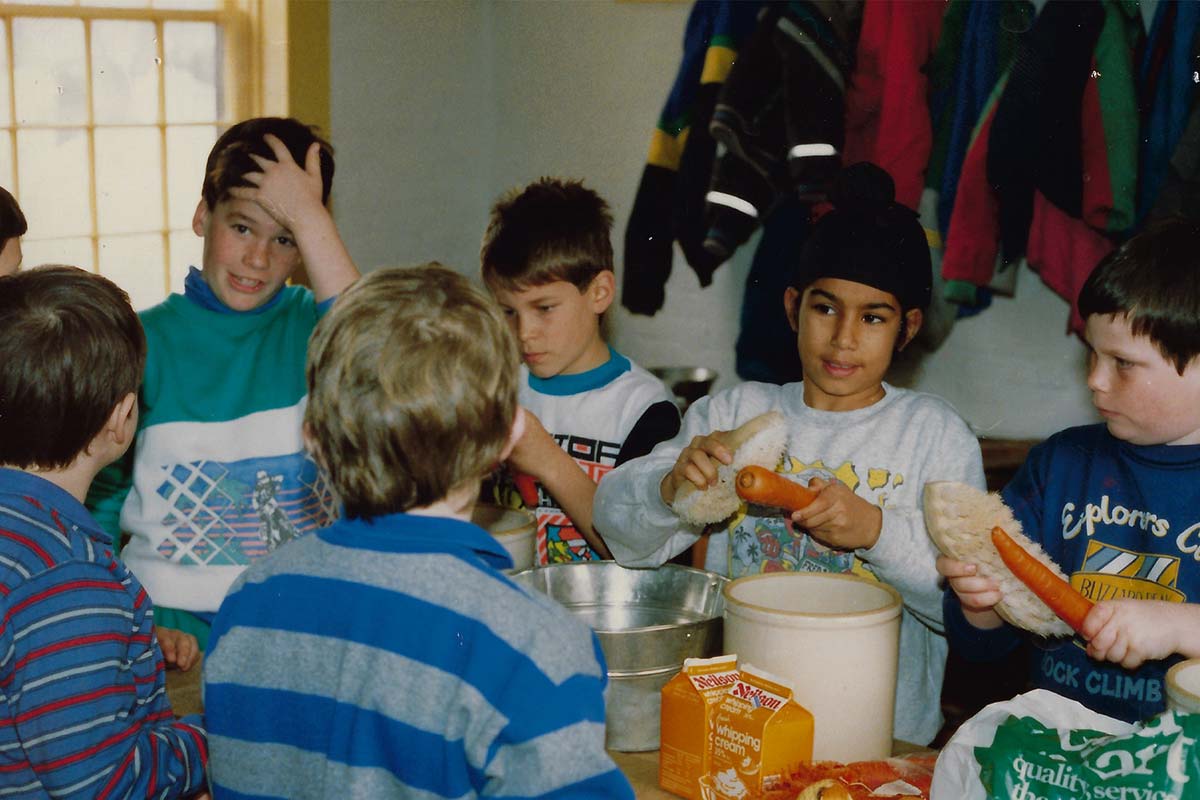
The values that guide him today are rooted in his experiences growing up.
Jagmeet’s early experiences are what shaped him and fuel his passion for justice. He developed a sensitivity to the unfairness that others experience, and in solidarity, committed himself to fighting injustice in all its forms.
“I saw kids around me—kids no less capable, no less worthy of respect and dignity—who were not in a position to follow their dreams, simply because their families couldn’t afford it. That struck me as incredibly unfair.”

As a child, Jagmeet found solidarity in unexpected places.
Jagmeet’s parents told him that in their childhood, their language was not respected, which caused them a sense of shame. He discovered that the Québécois have faced similar pressures in relation to their language and identity and quickly understood the parallels. At the age of 13, he began to learn the french language which stayed with him for the rest of his life.
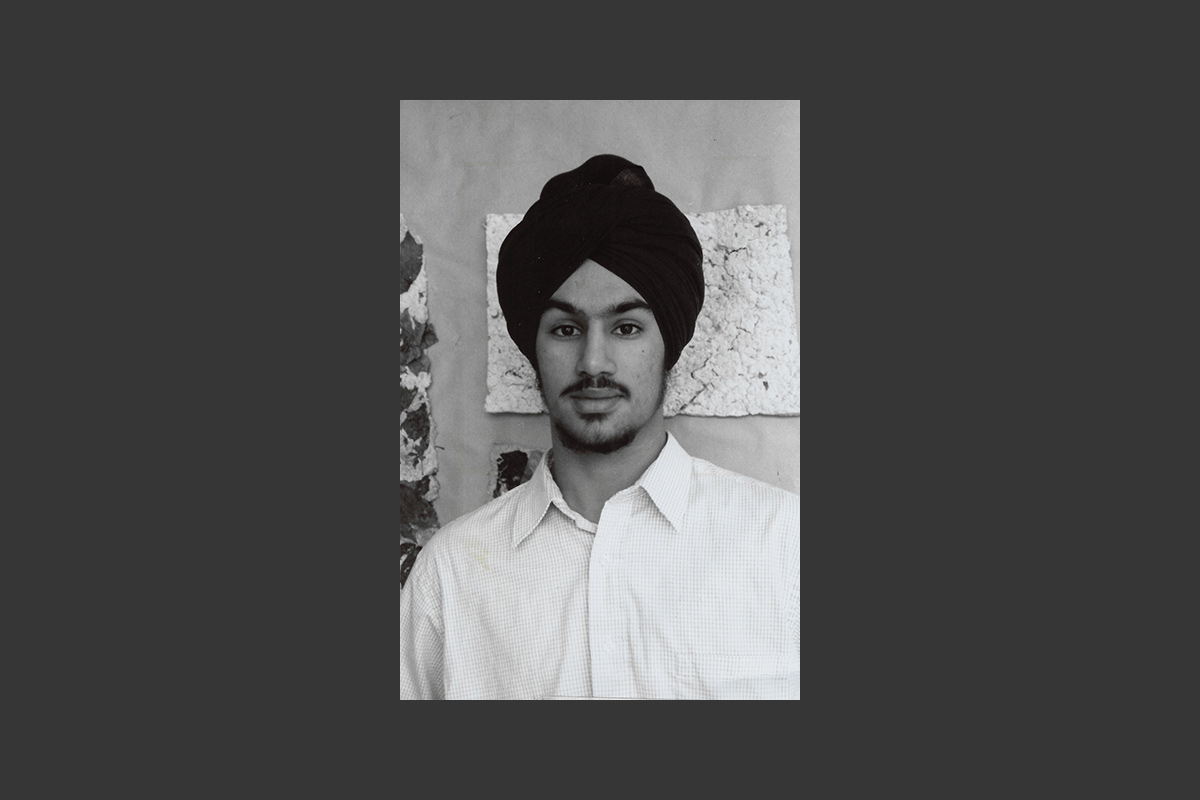
Jagmeet stepped up to help his family through hardship.
During university, Jagmeet’s father became ill and his parents were unable to work. Jagmeet became the sole income earner for his family, working retail jobs, and doing his best to support his siblings until their father was back on his feet.
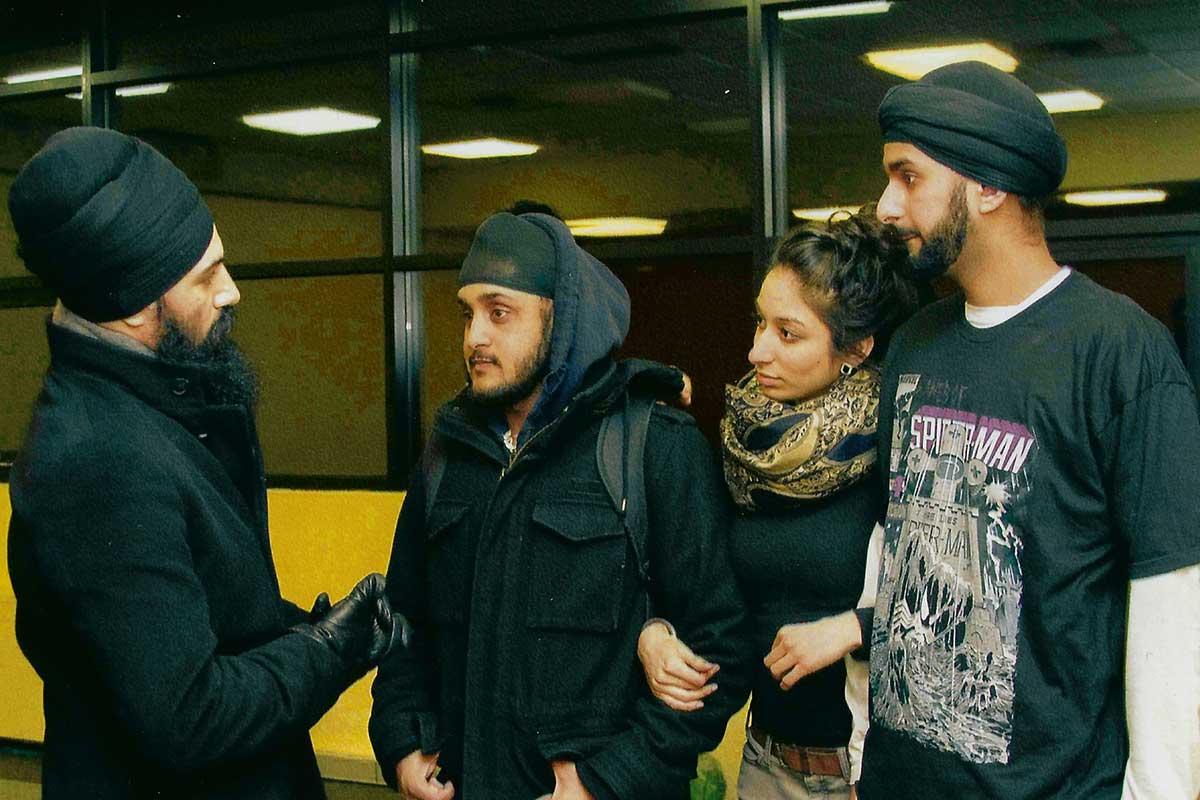
This is what drove Jagmeet to believe that better is possible.
At university, he was an outspoken activist who fought against raising tuition fees. He studied law so he could support community organizations fighting poverty, keeping tuition affordable, and advocating for equal access to justice for marginalized communities.
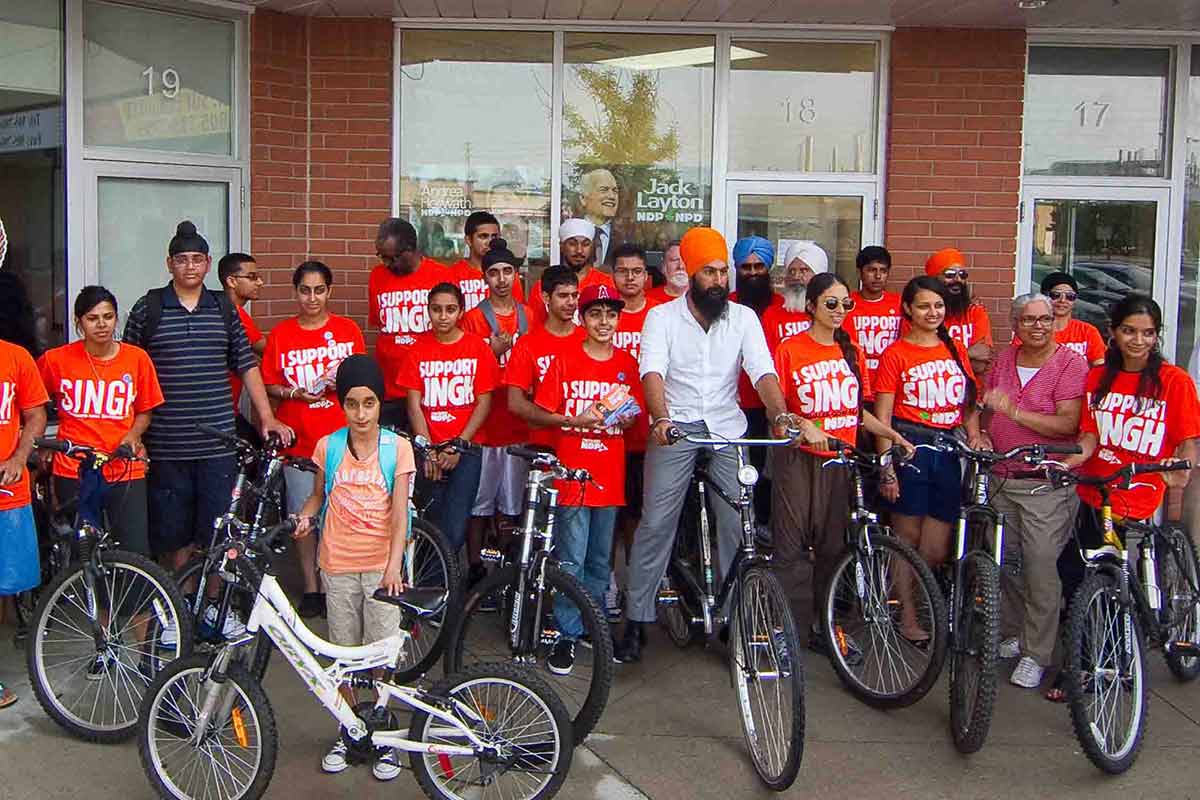
Jagmeet made the jump into politics in 2011.
The people and communities Jagmeet fought for needed an ally in government – so he decided to run. Right from the start, Jagmeet was told that a New Democrat could never win a seat in the Peel Region. He refused to believe the cynics.
“The groups I worked with—fighting against poverty, against tuition fees, and inequality — felt unsupported. They didn’t have an ally they could turn to in government. They needed a partner.”
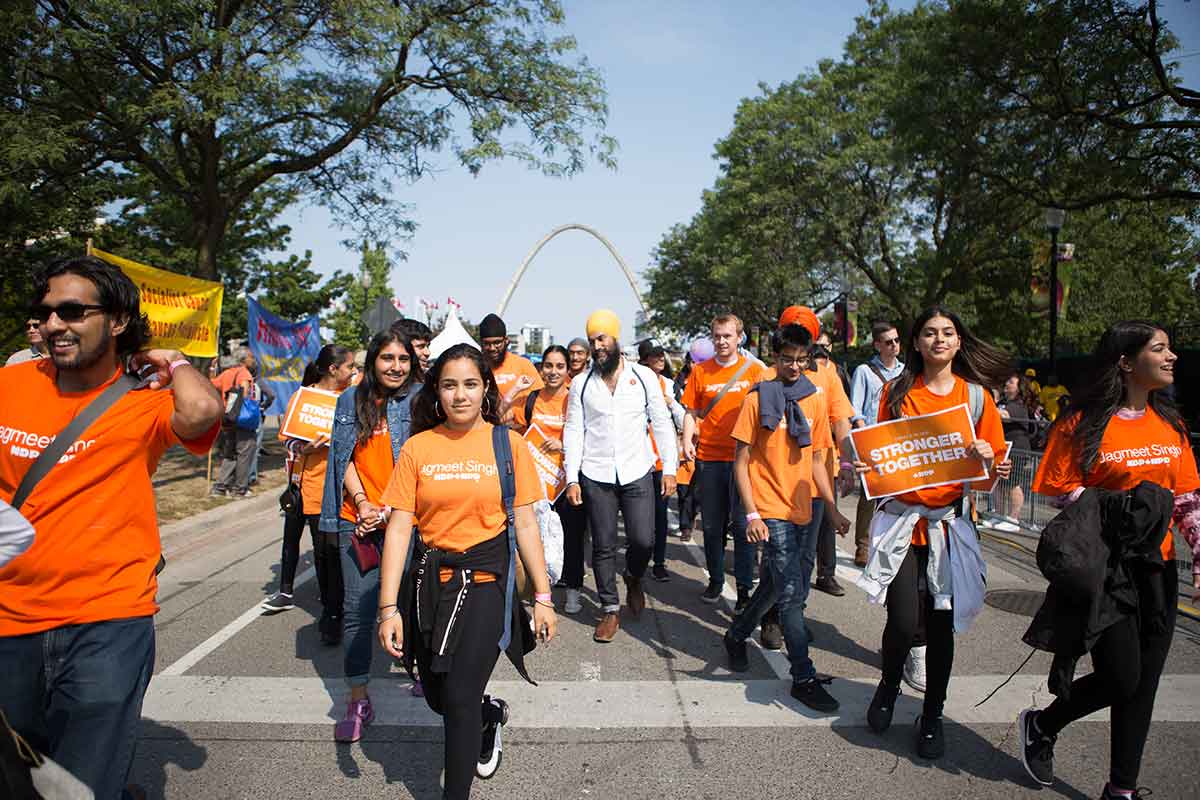
Jagmeet believes that the key to success is in empowering young people.
By mobilizing young people and providing a space for them to take on leadership roles in their own community, Jagmeet and his team proved the critics wrong and won – and Jagmeet went straight to work.
“I believe that when you create a safe space for young people to take on leadership roles, you’re investing in them - you’re giving them the opportunity to take on responsibility and be a part of something larger than themselves.”
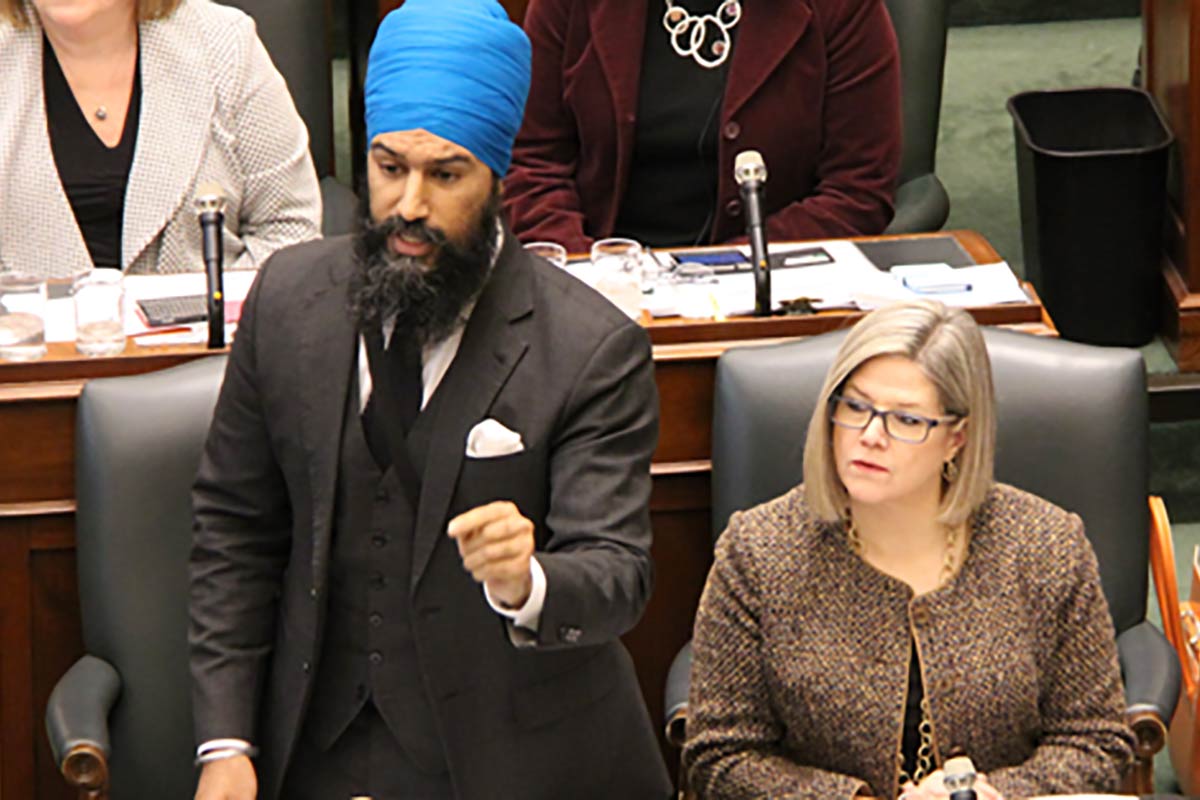
As an MPP, Jagmeet continued his fight for fairness.
Jagmeet used his platform as an MPP and Deputy Leader of Ontario’s NDP to fight for a fairer society. He took on the discriminatory practice of arbitrary police checks known as carding. He spoke up repeatedly on the need for good jobs and an end to precarious work. And he fought for the protection and expansion of public ownership over our utilities and public infrastructure.
“The defining feature of the NDP - of every New Democrat - is that we are not only offended by inequality, we put everything we have into fighting it.”
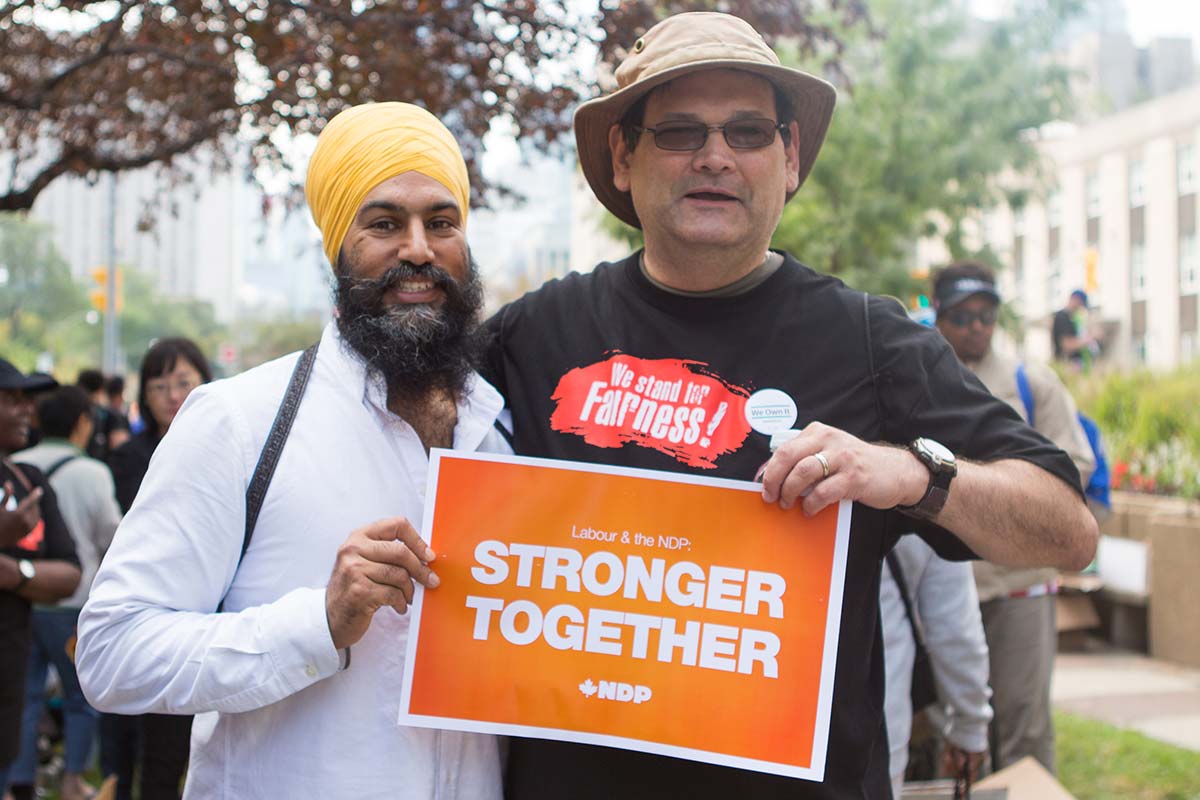
Jagmeet launched his campaign to be leader of Canada’s NDP on May 15th, 2017
He believes that Canada can be a place where we all rise, together. He ran a campaign focused on inequality, climate change, reconciliation and electoral reform.
“To make progress on these issues, to truly make Canadians’ lives better, we owe it to Canadians to form government.”
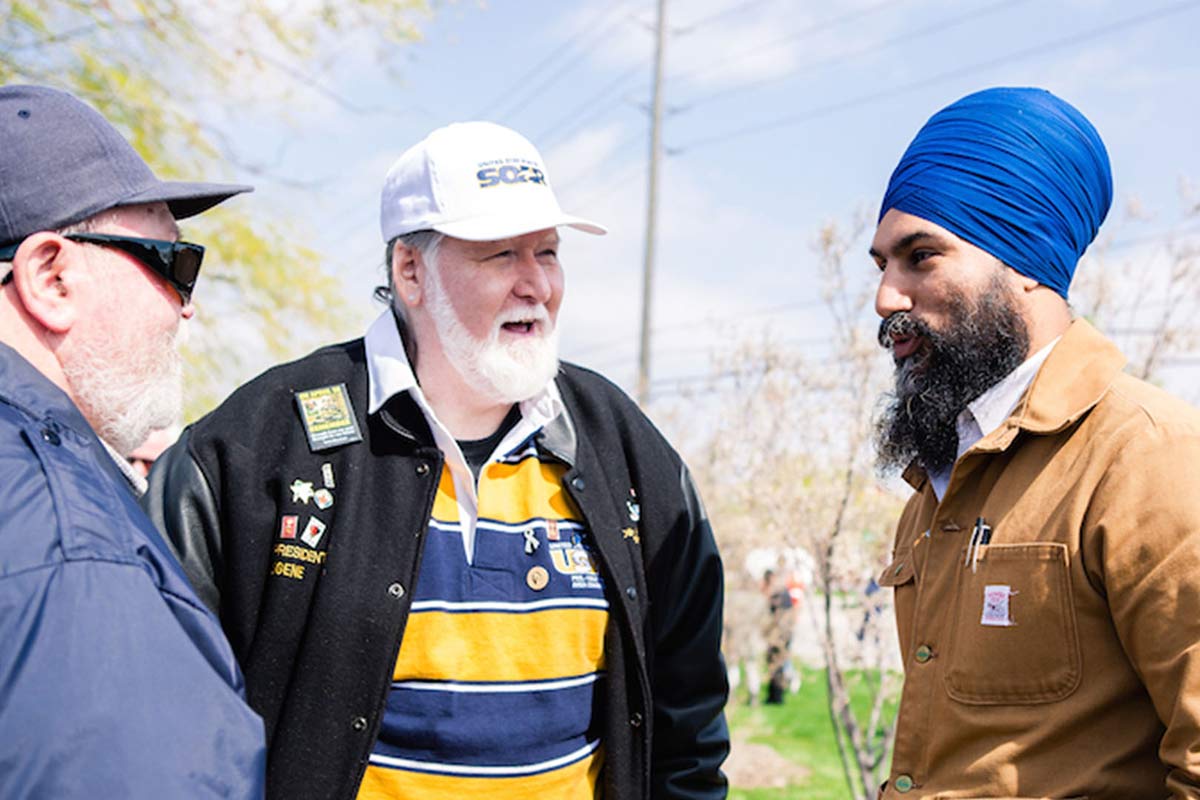
On October 1st, 2017, Jagmeet became leader of Canada’s NDP after a first ballot victory.
As leader, Jagmeet is putting everything he has into building that Canada – he is determined to fight for solutions people urgently need right now. That means fighting for good jobs to combat growing inequality. It means a real plan for our environment that includes workers and their families. It means pursuing true reconciliation with Indigenous communities.

Jagmeet and Gurkiran married in February of 2018
Gurkiran, an entrepreneur and humanitarian, tied the knot with Jagmeet early in 2018, just a few months after helping to elect Jagmeet as the Leader of Canada’s NDP.
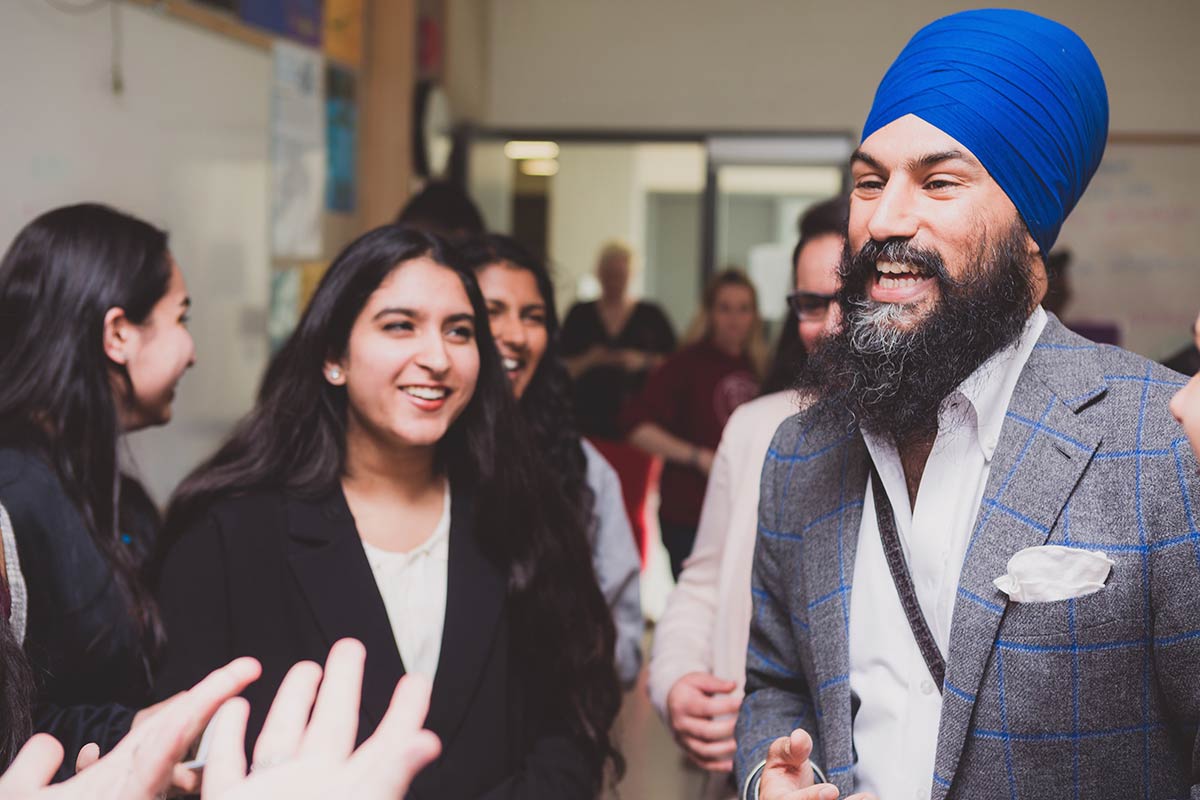
With love and courage, Jagmeet is determined to make a real difference, for more people.
Jagmeet's Commitments
A New Deal for People:
New Democrats’ Commitments
to You
From our downtowns and suburbs to small towns and rural communities, people are worried about what the future holds – and how their children will make a life for themselves. The stress that families carry, the worry that keeps people up at night, and the suffocating pressure that people feel as costs keep tightening the family budget – it’s all caused by the choices that Liberal and Conservative governments have made to do less and less for people. If we want different results, we need to make different choices.
What we need now is the courage to act together. And that is exactly what New Democrats offer to Canadians. Our New Deal for People is our view of where our country can go over the next decade and our commitment to the real results that we will work to deliver for Canadians.
Explore our New Deal for People:
Type what matters to you (e.g. jobs, climate)
AffordabilityEconomyClimate ActionBetter CareReconciliationStrong CommunitiesDoing What's Right
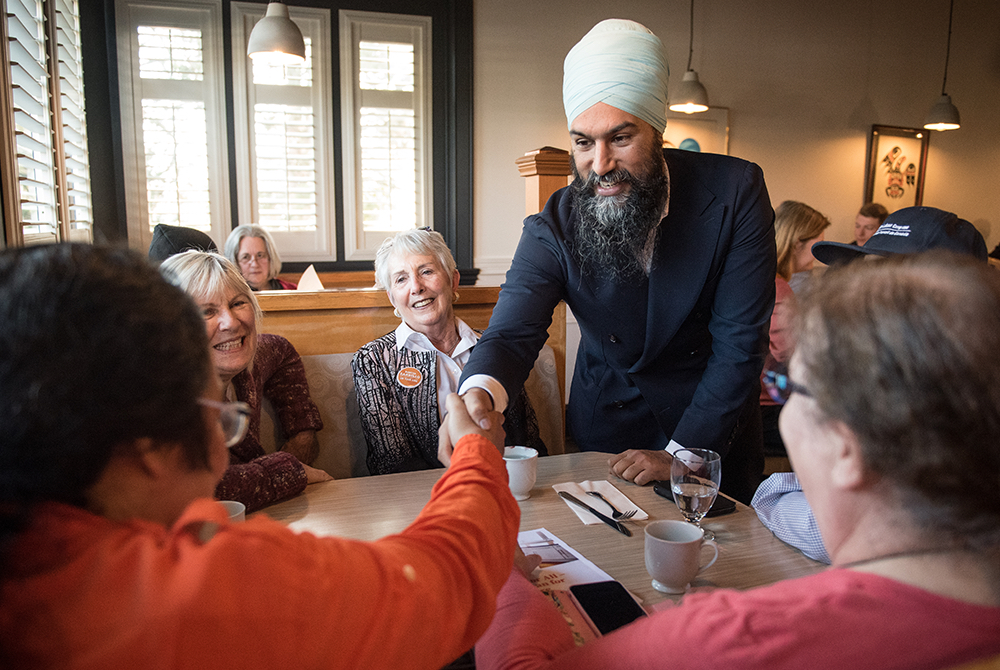
Making life more affordable for everyday people
People are getting squeezed as everything from housing to medication gets more expensive. We’ll put a stop to skyrocketing prices and make sure young people can build a good life.
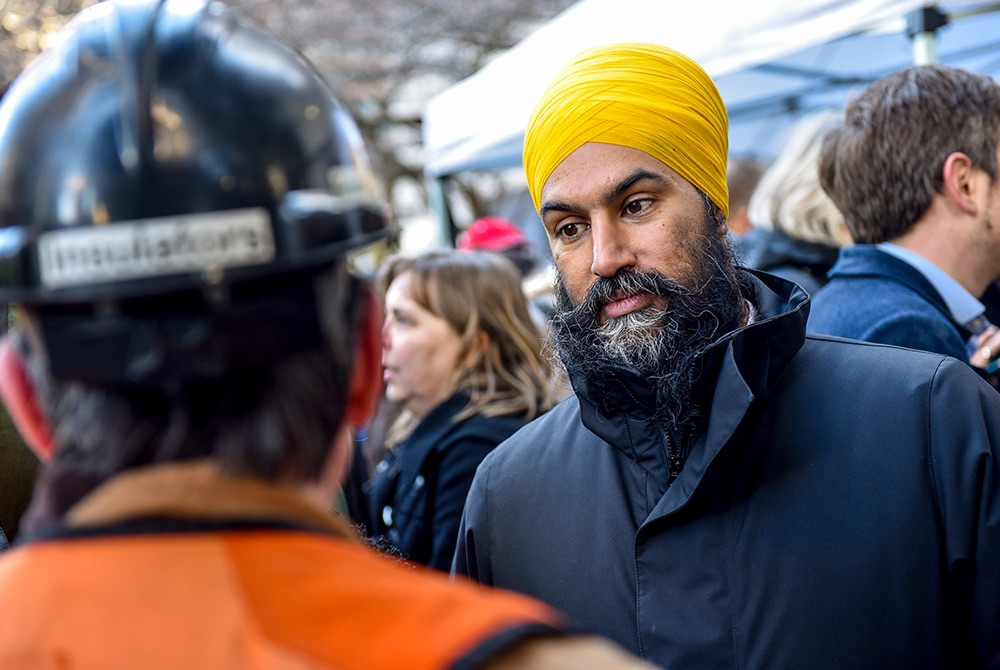
Building an economy that works better for more people
People are finding it harder to keep up as wages flatline while the wealthiest people keep getting richer. New Democrats will build an economy where it’s easier to get a good job and earn a fair wage.

Protecting our air, land, and water, securing our future
Canada is facing a climate emergency and we need a government with the courage to make the right choices for our environment and for people.
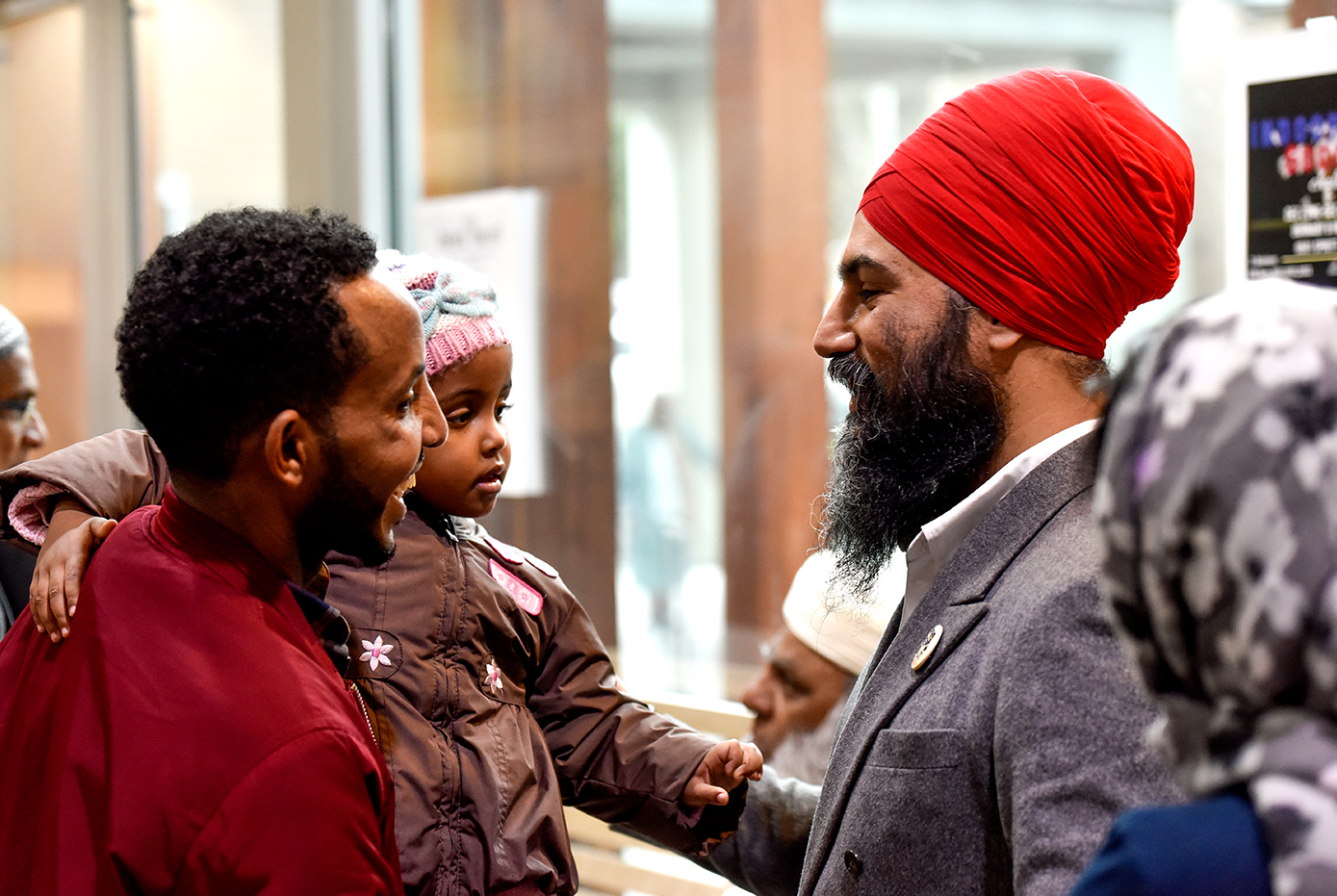
Taking better care of each other
We’re committed to a Canada where we take better care of each other – and reinvest in the public services we all count on – like a new deal for health care that includes pharmacare for everyone.
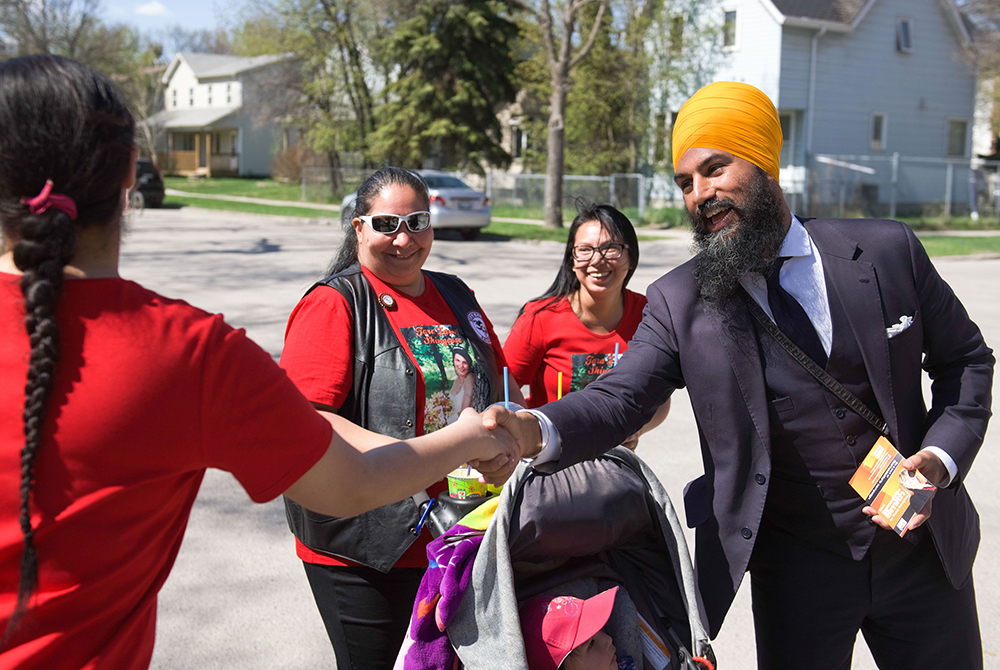
Reconciliation at the heart of what we do
We’re committed to the important work of reconciliation in true and equal partnership with Indigenous communities. We’ll ensure Indigenous communities have safe housing and clean water, high quality education, and access to health care.
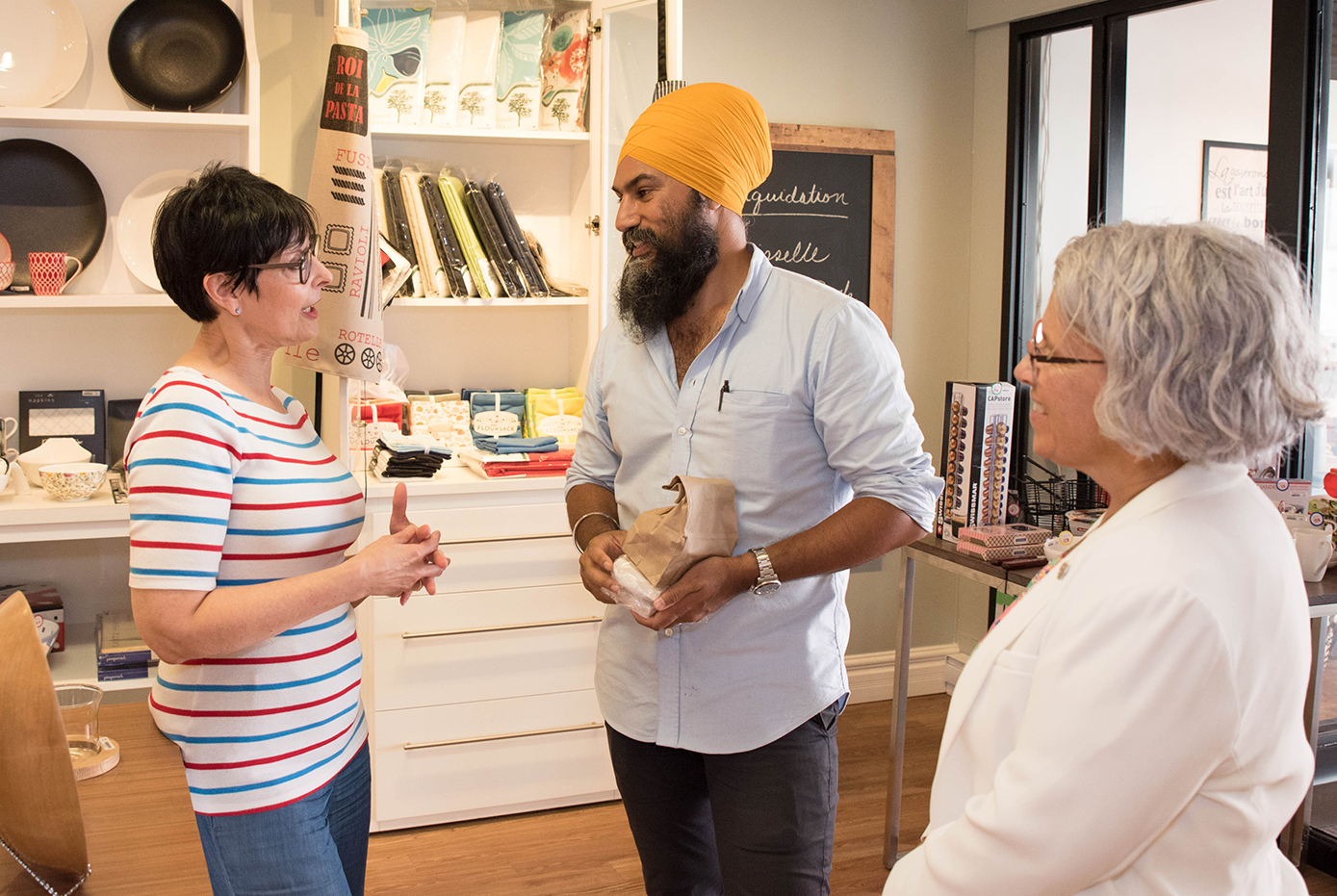
A new deal to build stronger, more vibrant communities
We can build safe and welcoming communities, invest in public infrastructure, support Canadian art and culture, and make sure people have access to the services they count on no matter where they live.
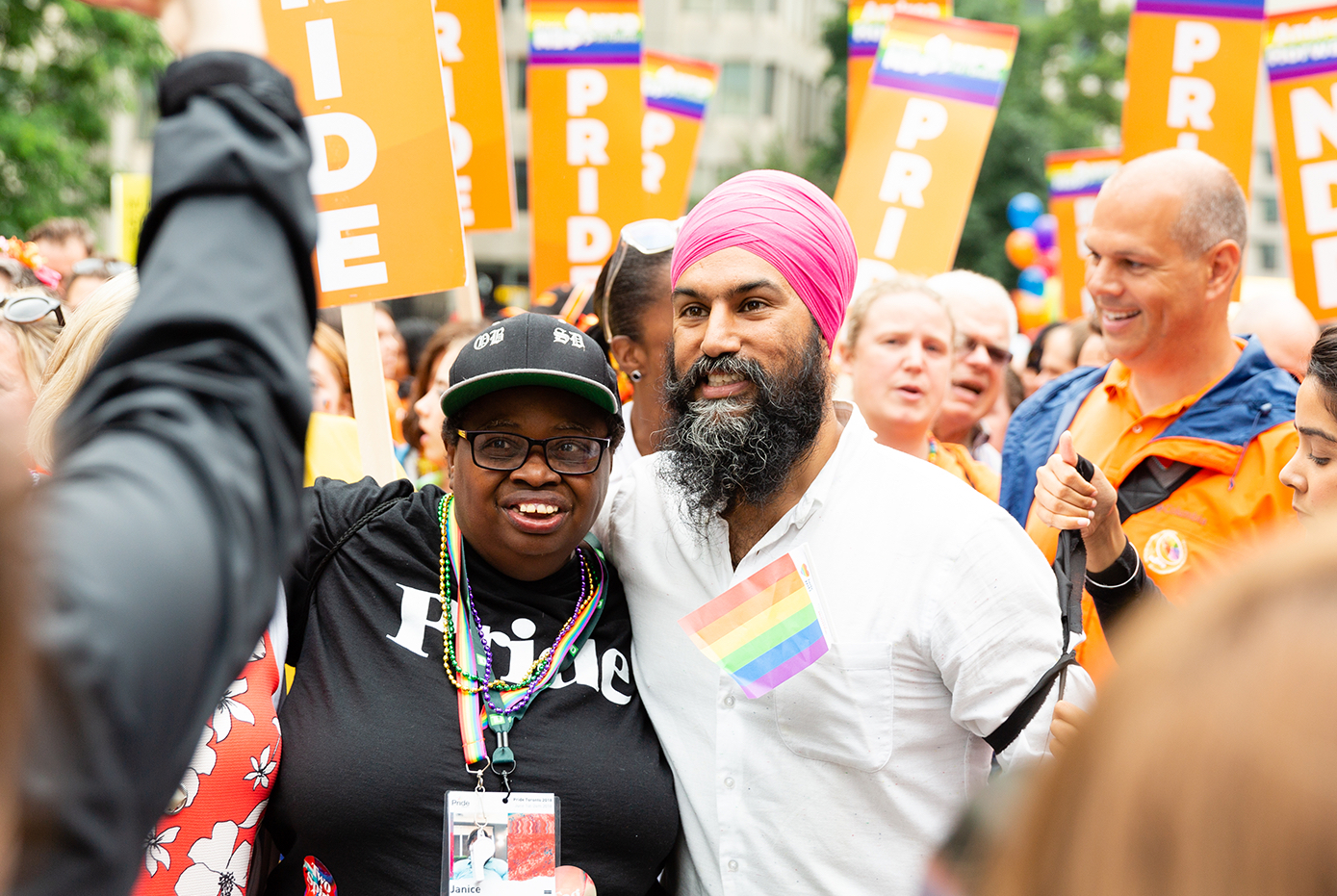
The courage to do what’s right
New Democrats are committed to a future where racism, discrimination, homophobia, and transphobia have no place, where we fight for reproductive justice and an end to gender-based violence, and where government treats people with the respect and dignity we all deserve.
Quote
“
Together, we can turn our vision of a more prosperous, more sustainable, and fairer country – into a better future for all of us.
More
Our fiscal approach
For too long, governments have chosen to strip away the services Canadians count on, while helping their rich friends and the biggest corporations. New Democrats will make the rich pay their fair share – and make the investments families need now.
Download our full list of commitments
In the coming months, this is the roadmap that will guide us as we talk to millions of Canadians. Read the full document here.
'
Sorry about this post - I have removed it and hopefully this thread is now back to normal.
Bingo!
This is why voters are shifting to the NDP
To tackle economic insecurity we need an NDP government
https://thetyee.ca/Opinion/2019/10/18/BC-Fed-Tackle-Economic-Insecurity/
‘Supportive housing saved my life’: For BC voters housing and homelessness looms large
Singh at his presser just now with Gord Johns in Port Alberni said the NDP platform includes raising the minimum wage above$15 an hour to a living wage.
Try living on $15 an hour anywhere in Canada!
The people on minimum wage know the system is rigged against them
Which political party would do the most to tackle growing inequality?

The issue of wealth and income inequality has not been front and centre in the current election campaign.
There has been much talk about affordability, which means rather different things to different people. Some worry about whether or not they can afford a new car or a new smartphone. To others, affordability is more of a life and death affair. They can't afford a safe, clean, decent place to live.
Overall, the fact that wealth in Canada has become more and more concentrated in the hands of a very few, while incomes at the lower end of the scale have stagnated, has not elicited much interest from those charged with reporting on the 2019 campaign. There was not a single question on this issue in any of the televised debates.
NDP Leader Jagmeet Singh did try to put inequality on the agenda, and the Greens' Elizabeth May followed him. Coverage of their campaigns tended to focus elsewhere, however.
Journalists and pundits carried on about Singh's preternatural ability to connect with voters on a human level and about May's persistent tendency -- too strident for many commentators -- to sound the alarm on a warming planet.
Affordable housing, taxing the rich and support for new parents
For those of us who think the increasing gulf between the super-rich and the rest of us is an issue, a Quebec-based non-partisan institute, l'Observatoire québécois des inégalités (roughly translated as the Quebec institute for the study of inequality) has graded the platforms of the various parties as to how effectively they address economic inequality.
The Observatoire brought together experts from both the U.S. and Canada and had them grade some key promises of all the parties, without telling them which parties had made them. The institute only found three promises for each party that were specific enough to grade in terms of their potential impact, positive or negative.
Only two campaign planks merited an A grade from the Observatoire's expert panel: the NDP's promises to institute a one per cent wealth tax on fortunes over $20 million, and to create half a million new units of affordable housing over ten years.
The experts gave high marks to the Liberal pledge to extend paternity/maternity benefits to all new parents, even those who had not worked the requisite hours in the previous year. This measure will be a boon to those who work in the insecure, gig economy. They also liked the Liberal plan to increase the guaranteed income supplement for the poorest among senior citizens.
For the Greens, the Observatoire said the pledge to make higher education free would significantly reduce inequality, as would the Green promise to abolish the tax deduction for stock options, which high paid executives often receive as a way of avoiding taxes. This is also a longstanding NDP idea. The Liberals announced a yet-to-be-instituted $200,000 cap on this form of remuneration in their most recent budget.
Even the Conservatives get some credit for one proposed measure, the promise to lower the tax rate on the lowest bracket.
But the Observatoire gives the Conservatives a failing grade for their promise to restore the giant loophole the Liberals closed for so-called private corporations. High income professionals, such as doctors, often set up these incorporated entities to split their income with family members, by putting them on the payroll or paying them dividends. The corporate income tax rate is also lower than the personal rate.
The organized business lobby gave Liberals a lot of grief for these tax changes. In response, Justin Trudeau's government softened the changes somewhat. It devised a way, for instance, to avoid unnecessarily burdening family farms with increased taxes.
The Conservatives were not placated, however, and want to scrap the Liberal changes altogether, which will be of great benefit to the wealthiest earners.
The Observatoire gives its lowest marks to Maxime Bernier's Peoples' Party, which pledges to balance the budget in two years through severe cuts to social spending. Evaluating that fringe party hardly seems to have been worth the effort, since they are likely heading for an electoral result of between one and zero seats.
A tough choice on election day
The results of the Observatoire's exercise underscore the agonizing nature of the choice in this election for voters who care deeply about issues of social justice and equity.
Some of them (that is, you) might be tempted to opt for Trudeau's Liberals, who are definitely not nearly as scary as Scheer's Conservatives.
The current Trudeau gang are not the Chrétien/Martin Liberals of the 1990s, who obsessed over deficit and debt, refused to raise taxes on even the wealthiest of the wealthy, and brutally slashed transfer payments to the provinces for social services, education and health.
The Justin Trudeau Liberals have taken at least a preliminary stab at making the tax system more progressive, have put some money into the pockets of the poorest families and have maintained and even modestly increased transfers to the provinces for basic services.
But Liberals are a slippery breed.
They can be social justice crusaders one day and corporate sycophants the next. You never know which Liberal is going to show up.
During the 1990s, the New Democrats had been reduced to a handful of seats in the House. The right-wing populist Reform party was the main opposition in English Canada, while, in Quebec, the ardently separatist and politically opportunist Bloc Québécois dominated. As a result, the Liberals of the day felt a significant pull to the right -- fueled by unabashedly pro-market-solutions mainstream media -- and their policies showed it.
Today, the caring and sharing Liberal party is on display, although the NDP -- and to the extent they focus on such matters, the Greens -- have much more root and branch approaches to building a society that is more fair, just and equal.
The question for progressive voters is: Do they succumb to the invitation to vote strategically to head off the disaster of a Conservative government, or do they vote to keep the vacillating, self-styled party of the centre from slipping back into its big business, pro-profit and pro-corporate personality?
It will not be an easy choice. Good luck with it.
Karl Nerenberg has been a journalist and filmmaker for more than 25 years. He is rabble's politics reporter.
http://www.rabble.ca/news/2019/10/which-political-party-would-do-most-tackle-growing-inequality
Singh at his presser just now with Gord Johns in Port Alberni said the NDP platform includes raising the minimum wage above$15 an hour to a living wage.
Try living on $15 an hour anywhere in Canada!
The people on minimum wage know the system is rigged against them
This discussion should also be had after the election once the complexion of the next government is known. My own views on this have evolved somewhat over the last few years but I still think that a government (and hence taxpayer) funded guaranteed annual minimum income is a far better solution to poverty and near-poverty than is a big minimum wage hike. One of the worst outcomes of the Ford government's election was the cancllation of the Ontario pilot projects on a GAI.
I am not saying that the two are mutually-exclusive, only that there are far better solutions that can also benefit children, seniors, the unwaged, first peoples on reserve, etc and if done right, the students that make up the largest single group of minimum wage earners. A GAI also spreads the funding sources more broadly across the society by drawing on the income tax base (which is progressive) - as opposed to payers for goods and services (where the bulk of minimum wage earners work) which is not necessarily progressive and can actually exacerbate the challenges faced by those not in the workforce.
I know that this is probably heresy on here but I think a renewed discussion would be worthwhile, especially as federally regulated employees make up a comparatively small part of the Canadian workforce.
Could,t a link be provided rather than a post miles long with a ton of pictures? I think you just discouraged many from participating in this thread and making people load for ever.
A very unfriendly and a bit selfish post to take all the bandwidth of a thread into a single post of information - pictures no less - that can be found on ndp.ca... Sorry but I really want to say something so we do not encourage this. Just imagine how people could shut down threads with all the BQ candidates, all the Liberals, All the NDP, maybe illustration of what is wrong with the PPC and CPC -- it is a thread stopper. It is disrespectful of those coming here to find something original and new. Not everyone is this partisan either.
Agreed. It makes the thread difficult to read.
Thank goodness for people like this author who consistently cut through all the right-wing LIberal and Conservative scams to rip off working people.
How private enterprise took over Canada's public wealth

The Sport and Prey of Capitalists: How the Rich Are Stealing Canada's Public Wealth
Linda McQuaig
Dundurn
2019
24.99
In the 2015 federal election, author and journalist Linda McQuaig ran for Parliament as an NDP candidate in the riding of Toronto Centre. Her opponent was Liberal candidate Bill Morneau, who won the riding and went on to become minister of finance.
During the campaign, Morneau and Liberal Leader Justin Trudeau championed the idea of creating a Canadian infrastructure bank, which would "provide low-cost financing for new infrastructure projects." The bank would help finance things like public transit and housing, by borrowing the funds from the public through the sale of bonds to Canadians or their pension funds. People in Canada would finance the construction of infrastructure they benefit from (and own it, collectively).
"I thought it was a good idea," McQuaig told me in a recent phone interview. "But he was being dishonest."
After meeting the Wall Street tycoon Larry Fink, who manages BlackRock (one of the world's largest investment funds) at a Davos meeting in 2016, Trudeau quickly changed his tune. Private capital could have a role in public infrastructure -- in fact, he asked BlackRock to help his government design the bank.
In 2017, the prime minister and Morneau introduced the Canada Infrastructure Bank. The Crown corporation gives private capital the opportunity to invest in and own the infrastructure that is built for people in Canada. This "bait-and-switch" is the subject of the first chapter of McQuaig's latest book, The Sport and Prey of Capitalists: How the Rich are Stealing Canada's Public Wealth.
"Private finance looks for investments that make profits of seven to nine per cent," says McQuaig. "Governments can borrow at low costs. You throw out that advantage if you bring in private finance."
You also hand over any potential future profits, which otherwise could be reinvested in public programs. That's exactly what happened when, in 1999, Mike Harris sold Ontario's Highway 407 for $3.1 billion, in what McQuaig calls "the worst deal of the century."
The toll highway, built in a public-private partnership, had been constructed by the NDP government of Bob Rae, who promised that the tolls would only be used to pay off the building costs, which might take about 30 years. Since its sale to the consortium 407 International, tolls have risen by more than 300 per cent. In 2014, 407's owners reaped almost $900 million -- all of it from Ontarians driving on a publicly financed highway. The highway has been valued at upwards of $27 billion.
As the book's subtitle makes clear, McQuaig is interested in more than just our disastrous history of privatization. The bulk of The Sport and Prey of Capitalists tells a different, little-known history of public enterprise in Canada.
"When I say public wealth, it is services, benefits, things that we can publicly benefit from. Public wealth to me is a way to capture the notion that something is of value to all of us," says McQuaig. "One of the things I was trying to do in the book, to get people motivated, was to tell them these stories about public enterprise and the kind of battles we had to go through to achieve them."
Ontario Hydro is one such example. Adam Beck, a Conservative MPP and mayor of London, Ontario, played a key role in bringing together people from municipalities across the province to campaign for a public power utility in Ontario in the early 1900s. The campaign was successful. After the 1905 provincial election, the Conservative government rejected a corporate syndicate's application for rights to water power at Niagara Falls. Premier James Whitney declared "that the water power all over the country should not in the future be made the sport and prey of capitalists and shall not be treated as anything else but a valuable asset of the people of Ontario."
Such examples should inspire us, says McQuaig: "The odds against achieving these things back then were as bad then as today. But they managed to make it a popular enough movement."
The book includes chapters describing the creation of Connaught Labs, a publicly owned pharmaceutical company that pioneered research into vaccines and new disease treatments; public banks like the Alberta Treasury Branch; and the Canadian National Railway, which helped establish nation-wide radio stations, the foundation for the CBC.
Progressives and radicals won't necessarily praise all her examples of Canadian public enterprise (the development of the Avro Arrow -- an innovative military fighter-jet created in the late 1950s, for example) but one can't ignore the vital importance of harnessing government investment for the public good.
It remains to be seen if the results of the 2019 election will mean more Trudeau-led privatization, given the balance of power in Ottawa. One hopes the NDP will be able to use their position in Parliament to move forward on issues like public investment in infrastructure and programs, reconciliation with Indigenous nations, and climate change.
McQuaig canvasses one potential way to kickstart a "Green New Deal" in the final pages of the book: the expropriation of the GM auto-manufacturing plant in Oshawa, slated to close at the end of the year.
"Trudeau spent $4.5 billion nationalizing the pipeline. That's taxpayer money being spent on fossil fuels, instead of a green economy," said McQuaig. "I'd like to see Jagmeet Singh pick up on the plan put forward by workers at the GM plant to nationalize it and make vehicles for green public transit. It seems perfect. It would combine nationalization, action on climate change, and defending workers."
Ultimately, this is the idea that lies at the heart of McQuaig's book, for all the stories of privatization that begin it: the public good that we have achieved in the past through collective action and public investment, and the things we could still.
Yutaka Dirks is a writer and editor living in Winnipeg. He has written for the Los Angeles Review of Books, THIS, Briarpatch, The Montreal Review of Books, Alberta Views and other publications. His work is included in Beautiful Trouble: A Toolbox for Revolution, and has been nominated for the CBC Creative Non-Fiction Prize and the Canadian Association of Journalists/CWA Award for Labour Reporting.
Image: Ontario Power Generation/Adam Beck Complex/Wikimedia Commons
RELATED ITEMS
Liberals fear a progressive challenger more than they fear the right wing
Author Martin Lukacs speaks about his new book, "The Trudeau Formula," which argues that progressive branding has played a huge role in Liberal party operations.
Fighting homelessness with disaster relief housing
In this excerpt from her new memoir, Cathy Crowe recounts how, in the late 1990s, she and fellow Toronto housing activists fought homelessness by erecting prefabricated housing on undeveloped land.
'The Big Stall' details how neoliberal think tanks blocked action on climate change
Donald Gutstein's well-researched new book is a deep dive into the strategies that Canadian oil companies and their friends have implemented to prevent political action and reverse catastrophe.



